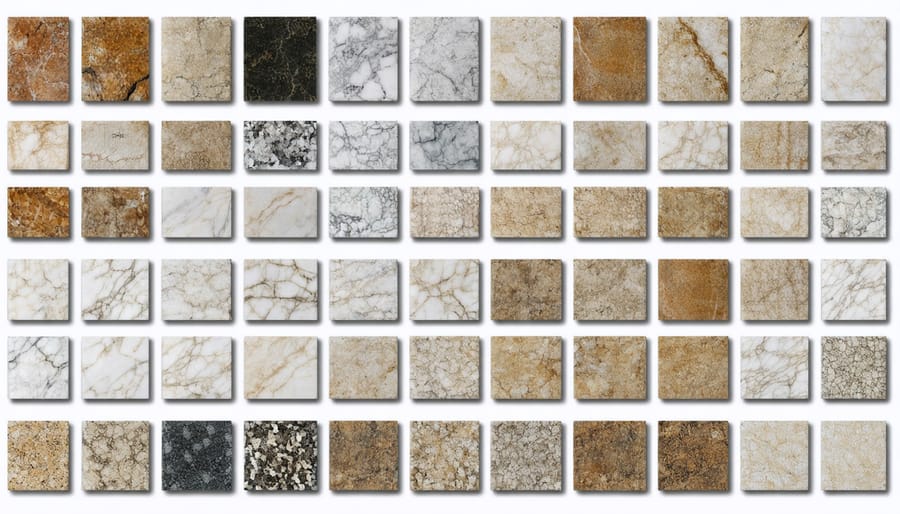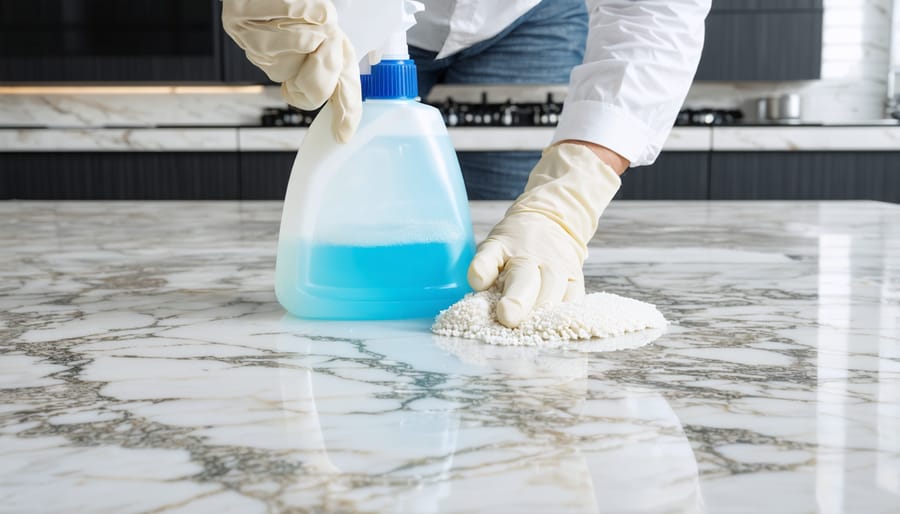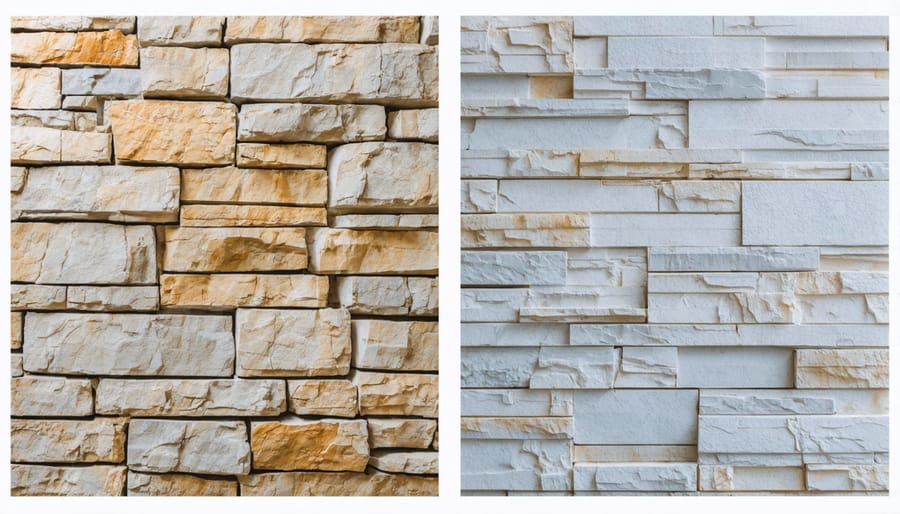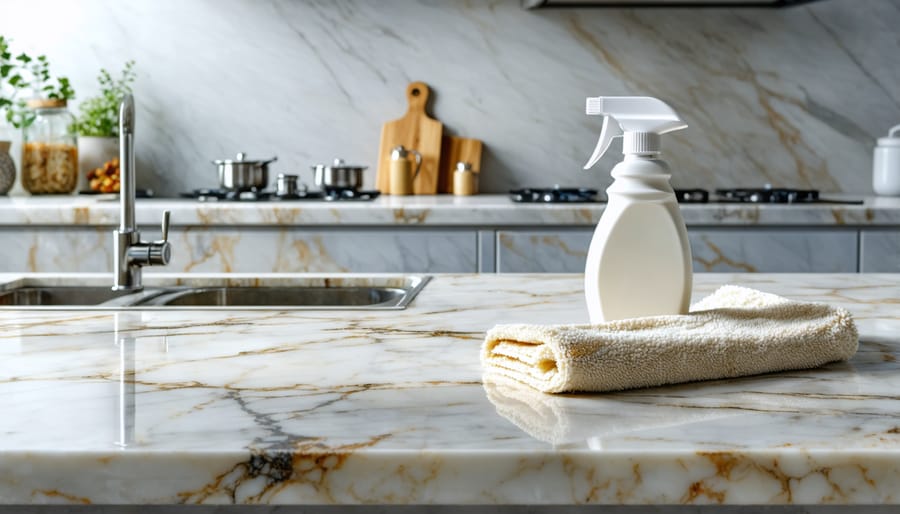Preserve your natural stone’s beauty with safe cleaning solutions for natural stone that protect while they clean. Choose a supplier of top quality Cleaning products to ensure you’re using the right materials for your specific stone type. Natural stone surfaces demand specialized care to maintain their elegance and durability without compromising their delicate composition. Professional stone care combines precise pH-balanced formulations with gentle yet effective cleaning agents that dissolve dirt and oils while protecting the stone’s natural properties. Modern stone maintenance has evolved beyond harsh chemicals to embrace innovative, environmentally conscious solutions that deliver superior results while preserving your investment’s integrity. Whether you’re maintaining marble, granite, limestone, or travertine, proper cleaning techniques and appropriate product selection are crucial for long-term preservation and appearance.

Common Commercial Stone Types and Their Cleaning Requirements
Marble and Limestone Care
Marble and limestone require special care due to their calcium carbonate composition, making them sensitive to acidic cleaners. Use pH-neutral cleaning solutions specifically formulated for these stones to prevent etching and surface damage. Always test cleaners on a small, inconspicuous area first. For daily cleaning, warm water and a soft microfiber cloth are often sufficient. When dealing with stubborn stains, use a poultice specifically designed for calcium-based stones. Never use vinegar, lemon juice, or other acidic household cleaners, as these will permanently damage the stone’s surface. Regular sealing is essential to protect these stones from staining and maintain their natural beauty. For best results, clean spills immediately and avoid letting standing water remain on the surface.
Granite and Quartzite Maintenance
Both granite and quartzite are durable silica-based stones that require similar maintenance approaches. For daily cleaning, use a pH-neutral stone cleaner and a soft microfiber cloth. Avoid acidic cleaners, including vinegar and citrus-based products, as these can etch the surface. Spills should be wiped immediately to prevent staining, particularly from wine, coffee, or oils. For periodic deep cleaning, use a specialized stone cleaner designed for granite and quartzite. Apply a high-quality stone sealer annually to maintain protection against stains and moisture. Always test new cleaning products on a small, inconspicuous area first to ensure compatibility with your specific stone surface.
Travertine and Onyx Special Considerations
Travertine and onyx require special attention due to their porous and delicate nature. These stones are particularly sensitive to acidic cleaners and harsh chemicals, which can etch their surface and cause permanent damage. Always use pH-neutral, non-abrasive cleaners specifically formulated for natural stone. For travertine, avoid excessive water exposure as it can seep into the stone’s natural holes and cause discoloration. Onyx, being translucent and soft, demands gentle cleaning methods to preserve its lustrous appearance. Both stones benefit from regular sealing to protect against stains and moisture infiltration. When cleaning, use soft microfiber cloths and avoid abrasive scrubbers that could scratch the surface. Spills should be blotted immediately, never wiped, to prevent liquid absorption into the stone’s pores.
Commercial-Grade Natural Stone Cleaning Solutions
pH-Neutral Cleaners
When it comes to maintaining natural stone surfaces, pH-neutral cleaners are essential for preserving the stone’s integrity and natural beauty. These specialized cleaners maintain a balanced pH level of 7, preventing the acidic or alkaline damage that can permanently etch or dull stone surfaces.
Leading manufacturers offer several reliable options for stone care. Brands like Stone Care International and Lithofin produce professional-grade neutral cleaners specifically formulated for marble, granite, and other natural stone surfaces. These products effectively remove dirt and grime while protecting the stone’s finish and seal.
For daily cleaning, we recommend using products like Marble Life Professional’s Daily Stone Clean or FILA’s Cleaner Pro. These solutions are gentle enough for regular use but powerful enough to handle common spills and dirt accumulation. For commercial applications, StoneTech Professional’s Stone & Tile Cleaner offers excellent results in high-traffic areas.
When selecting a pH-neutral cleaner, look for products that:
– Are specifically formulated for natural stone
– Contain no acids, bleach, or abrasive ingredients
– Don’t leave residue or streaks
– Are biodegradable and environmentally friendly
– Come with clear application instructions
Remember to always test new products on a small, inconspicuous area before full application, and never mix different cleaning solutions.

Stone-Safe Disinfectants
When it comes to disinfecting natural stone surfaces, choosing the right commercial products is crucial to maintain both cleanliness and stone integrity. Several manufacturer-approved disinfectants are specifically formulated to be safe for use on natural stone while effectively eliminating harmful bacteria and viruses.
Leading stone-safe disinfectants typically contain quaternary ammonium compounds (quats) rather than harsh acids or bleach. These products maintain a neutral pH balance (around 7) and don’t contain abrasive ingredients that could etch or scratch stone surfaces. Popular options include Stonetech Professional Stone & Tile Cleaner, Granite Gold Disinfecting Wipes, and MB Stone Care MB-1.
Before applying any disinfectant, always test it on a small, inconspicuous area first. Apply the product using a soft microfiber cloth or non-abrasive sponge, and avoid letting the solution pool on the surface. Most stone-safe disinfectants require a specific dwell time (usually 5-10 minutes) to effectively kill germs.
For optimal results, work in small sections and ensure complete coverage. After the recommended contact time, thoroughly wipe the surface with a clean, damp cloth to remove any residual product. This prevents potential buildup that could dull the stone’s finish over time.
Remember that even stone-safe disinfectants should be used as part of a regular maintenance routine, not as daily cleaners. For routine cleaning, stick to pH-neutral stone cleaners, reserving disinfectants for periodic deep cleaning or when specifically needed for sanitation purposes.
Specialty Stain Removers
When dealing with stubborn commercial stains on natural stone surfaces, specialized stain removers are often necessary. These solutions are formulated specifically for different types of stains while remaining gentle on the stone’s surface. For oil-based stains, alkaline poultice compounds effectively draw out deep-set oils and grease. These are particularly useful for kitchen areas and food service environments where cooking oils frequently contact stone surfaces.
For organic stains like coffee, wine, or food spills, oxygen-based cleaners work well without damaging the stone. These should be applied carefully and tested in an inconspicuous area first. Rust stains, common near metal fixtures or furniture, require specific rust-removal products containing safe levels of acid that won’t etch the stone’s surface.
Paint or ink stains may require lacquer thinner or acetone-based products, but these should only be used by experienced professionals. For biological stains like mold or mildew, quaternary ammonium compounds provide effective removal while being safe for most stone types.
Always verify that any specialty stain remover is approved for your specific stone type. Some solutions suitable for granite might damage more sensitive stones like marble or limestone. After using any specialty cleaner, thoroughly rinse the area with clean water and dry completely to prevent residue buildup or water marks.
Professional Application Techniques
Daily Maintenance Procedures
Maintaining natural stone surfaces in commercial spaces requires a systematic approach to daily cleaning. Begin each day by thoroughly sweeping or dust-mopping the stone surfaces to remove loose debris and dirt particles that could potentially scratch the stone. For high-traffic areas, implement a schedule of dry mopping every 2-3 hours during business hours.
Follow dry cleaning with a damp mop using a pH-neutral stone cleaner diluted according to manufacturer specifications. Work in manageable sections, ensuring the cleaning solution doesn’t pool on the surface. For vertical surfaces like walls or counters, use a soft microfiber cloth with the same pH-neutral solution.
Address spills immediately to prevent staining and etching. Keep cleaning supplies readily accessible in designated areas, and train staff on proper response procedures. For food service areas, sanitize surfaces after cleaning using stone-safe disinfectants that won’t damage the stone’s finish.
Document all cleaning activities in a maintenance log, noting any areas of concern that may require additional attention. End each day with a final inspection of all stone surfaces, paying special attention to corners, edges, and grout lines. Remove any remaining marks or spots using appropriate stone-specific cleaning products, and ensure all surfaces are completely dry before closing.
Remember to rotate cleaning tools regularly and replace worn mop heads or cloths to maintain optimal cleaning effectiveness and prevent cross-contamination.
Deep Cleaning Methods
Deep cleaning natural stone requires a methodical approach to remove embedded dirt, stains, and accumulated residue without damaging the surface. Begin by thoroughly sweeping or vacuuming to remove loose debris. For intensive cleaning, use a pH-neutral stone cleaner diluted according to manufacturer specifications.
For heavily soiled areas, create a cleaning solution using warm water and a specialized stone cleaner. Apply the mixture using a soft-bristled brush or microfiber mop, working in small sections to ensure thorough coverage. Allow the solution to dwell for 5-10 minutes, but never let it dry completely on the surface.
Use a wet vacuum or clean mop to remove the dirty solution. For stubborn stains, a poultice may be necessary. Create a paste using an appropriate cleaning agent and a white absorbent material. Apply the poultice, cover with plastic wrap, and allow it to draw out the stain over 24-48 hours.
After deep cleaning, rinse the surface thoroughly with clean water multiple times to remove all cleaning residue. Dry the stone completely with clean microfiber cloths to prevent water spots. Finally, apply a high-quality sealer to protect the freshly cleaned surface and maintain its appearance.
For optimal results, perform deep cleaning annually or bi-annually, depending on foot traffic and exposure to contaminants. Always test cleaning solutions in an inconspicuous area first to ensure compatibility with your specific stone type.

Preventive Measures and Long-term Protection
Implementing preventive measures is crucial for long-term stone protection and maintaining the beauty of your natural stone surfaces. Start by establishing a regular cleaning schedule that includes daily dust removal and prompt attention to spills. Use walk-off mats at entrances to reduce dirt and grit that can scratch stone surfaces, and ensure these mats are cleaned regularly.
Apply a high-quality sealer appropriate for your specific stone type every 12-18 months, or as recommended by the manufacturer. Monitor the effectiveness of your sealer by conducting periodic water drop tests – if water no longer beads on the surface, it’s time to reseal.
Install protective felt pads under furniture legs and avoid dragging heavy objects across stone surfaces. In kitchen areas, use cutting boards and trivets to prevent direct contact between stone countertops and hot cookware or acidic foods.
Maintain proper indoor humidity levels (between 40-50%) to prevent moisture-related issues, particularly in bathroom areas with natural stone installations. Consider installing water softeners in regions with hard water to prevent mineral buildup and etching on stone surfaces.
Create a stone maintenance log to track cleaning procedures, sealing dates, and any incidents requiring special attention. This documentation helps establish effective care routines and identifies potential problem areas before they become serious issues.
Train cleaning staff or family members on proper stone care procedures, including:
– Using pH-neutral cleaners specifically formulated for natural stone
– Avoiding acidic or abrasive cleaning products
– Properly diluting cleaning solutions
– Using clean, soft cloths or mops for application
– Thoroughly rinsing surfaces after cleaning
By implementing these preventive measures consistently, you can significantly extend the life of your natural stone surfaces while maintaining their original beauty and functionality.
Maintaining natural stone surfaces requires a careful balance of effective cleaning and proper care techniques. Throughout this guide, we’ve explored various cleaning solutions and methods that help preserve the beauty and integrity of your stone surfaces. Remember that using pH-neutral cleaners, avoiding acidic or abrasive products, and promptly addressing spills are crucial steps in stone maintenance. Regular cleaning with appropriate solutions, combined with preventive measures like sealers and proper care practices, will significantly extend the life of your natural stone. By following these guidelines and choosing the right cleaning solutions for your specific stone type, you can ensure your stone surfaces remain beautiful and durable for years to come. When in doubt, always consult with stone care professionals or manufacturers for specific recommendations tailored to your stone variety.










